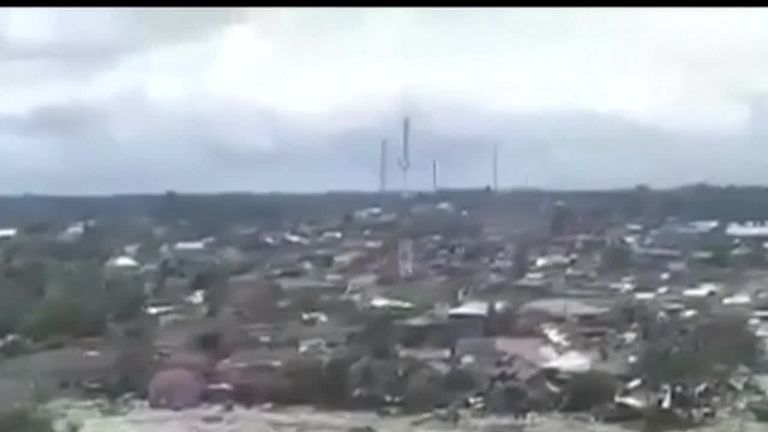Indonesia tsunami: Grim rhythm as search for the missing begins
As those living along the Sunda Strait begin to rebuild, many are in limbo waiting to hear the fate of their missing relatives.
Wednesday 26 December 2018 11:20, UK
There is a grim order and rhythm at Pandeglang hospital, up in the hills, away from the ruined coast.
Along one corridor, the forensic team works in a room to take photos and dental imprints of the dead bodies.
A little further along, relatives of the victims look over the pictures - not of the bodies themselves, which are unrecognisable, but of their clothes, watches, necklaces - trying to spot something their loved one used to wear.
If it's a match, the body is taken around the back, loaded into an ambulance and taken home.
Every half hour or so, roughly, an ambulance departs, reducing the number of missing.
Many, though, have not been granted even this grim reckoning.
Willy Siska, a 39-year-old employee of an electric company, is waiting outside, just as he was yesterday.
He is looking for his three-year old son Mohammed, who has been missing since Saturday.
He had gone to Tejung Lesung to watch the concert there with his family - his wife, daughter and son.
You've probably seen the terrifying moment already, captured on a smartphone, when the tsunami engulfs the stage while the band play.
Willy's company in Jakarta had organised the concert as a treat for families.
"It's a split second," Willy tells me. "It swept us away."
Willy said he was swept out to sea, along with his family.
"We got separated. I got swept out about two kilometres into the sea. I don't know how but I survived."
After two or three hours fighting for his life in the sea, Willy estimated, he made it back to shore and started looking for his family in the night.
He found his daughter Aliya himself, near a pool where the stage had been built.
His wife Yumita was found on Sunday evening, three kilometres away.
"My youngest son is still missing," he says.
"They don't know where he is. Either he died or he is still alive. That's why I am still looking for him."
Along the coast, there is a sense that the danger has finally passed.
People are beginning to return home, to try and put their lives back together.
We stopped at a temporary refugee centre in Ciput.
People had sheltered in a mosque there since Saturday; across the road, they cooked eggs and rice, and filled small packets with fried green beans.
When we got there early on Boxing Day morning, there were 600 people.
By midday, most had gone home. The locals, who had volunteered for four days, hinted they might now be outstaying their welcome.
In any case, it was time to go.
After the disaster, and the grieving, the focus is on those who remain.
At a church service in the evening of Christmas Day, at Carita Beach, the pastor told his congregation to pray for the families of the victims: "That those left behind might have strength and consolation from God."
Some are not ready for that yet.
At the hospital, Willy told me: "Today I will wait until evening. Tomorrow I will be back again to search."








